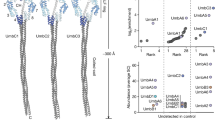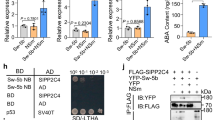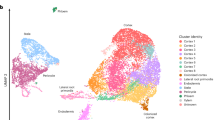Abstract
THIMANN1, using the standard Avena technique, showed that a growth-substance is produced in considerable amount in root nodules. He further-more claimed that the growth-substance produced is not derived from the meristematic tip of the nodule, but comes directly from the bacterial tissue. He found that the symptoms induced by 3-indole-acetic acid upon roots closely resembled those produced, in Molliard's work, by the action of sterile filtrate of nodule bacteria upon pea roots, and he consequently believed that the bacteria cultivated in laboratory media produce growth-substance in considerable amount.
This is a preview of subscription content, access via your institution
Access options
Subscribe to this journal
Receive 51 print issues and online access
$199.00 per year
only $3.90 per issue
Buy this article
- Purchase on Springer Link
- Instant access to full article PDF
Prices may be subject to local taxes which are calculated during checkout
Similar content being viewed by others
References
Thimann, K. V., Proc. Nat. Acad. Sci., 22, 511–514 (1936).
Went, F. W., and Thimann, K. V., "Phytohormones", 54–55 (New York, 1937).
Author information
Authors and Affiliations
Rights and permissions
About this article
Cite this article
CHEN, H. Production of Growth-Substance by Clover Nodule Bacteria. Nature 142, 753–754 (1938). https://doi.org/10.1038/142753b0
Issue Date:
DOI: https://doi.org/10.1038/142753b0
This article is cited by
-
Pursue the truth, devote to education: Chen Hua-Kui, a respectable educator and pioneer of China’s soil microbiology
Protein & Cell (2016)
-
Effects of cotyledons and nitrate on the nitrogen assimilation ofPhaseolus vulgaris
Mircen Journal of Applied Microbiology and Biotechnology (1987)
-
Abscisic acid and gibberellin-like substances in roots and root nodules ofGlycine max
Plant and Soil (1982)
-
Symbiotic variability in Vicia faba. 1. Genetic variation in the Rhizobium leguminosarum population
Euphytica (1977)
-
Abscisic acid inhibition of root nodule initiation in Pisum sativum
Planta (1971)
Comments
By submitting a comment you agree to abide by our Terms and Community Guidelines. If you find something abusive or that does not comply with our terms or guidelines please flag it as inappropriate.



